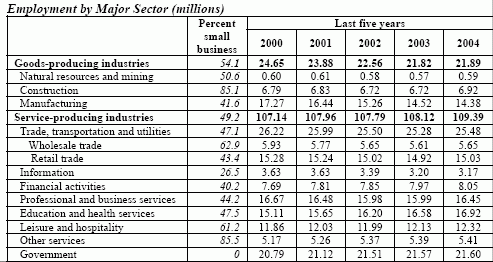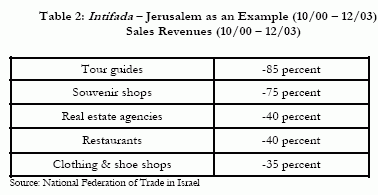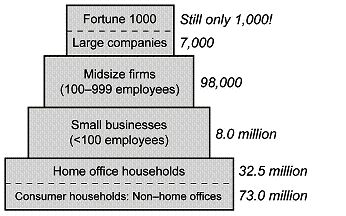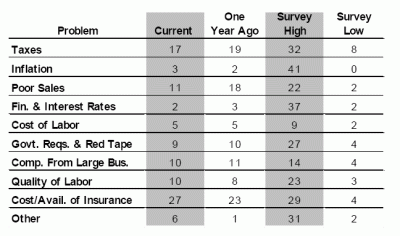
| ABOUT | ||
| SMALL BUSINESS TRENDS brings you daily updates on trends that influence the global small business market. | ||
 |
Anita Campbell, Editor | |
| Past life: CEO, corporate executive, tech entrepreneur, retailer, general counsel, marketer, HR ... (more) | ||
| email me | ||
 |
 |
||
| FREE BUSINESS MAGAZINES | ||
| Trade publications FREE to qualified professionals. No hidden offers and no purchase necessary. | ||
|
On Wall Street The Deal Computing Canada |
CIO Employee Benefit Oracle Magazine |
|
| 100+ additional titles. Click to browse. | ||
 |
| ARCHIVES & SEARCH | |||
| Previous Small Business Trends articles can be found at the links below: | |||
|
October 2003 November 2003 December 2003 January 2004 February 2004 March 2004 April 2004 May 2004 June 2004 July 2004 August 2004 September 2004 October 2004 November 2004 December 2004 January 2005 February 2005 March 2005 April 2005 May 2005 June 2005 July 2005 August 2005 September 2005 October 2005 November 2005 |
|||
|
Or, use the search box below to find a specific post: |
|||
 |
| NEWSLETTER |
| Sign up for our FREE Small Business Trends newsletter. (View Current)
We publish regularly and promise we won't share your email address with anyone. (Privacy Policy) |
 |
 |
| SMALL BIZ INFO & RESOURCES | |
 |
| BLOGS TO READ DAILY* | |
| * Don’t have time to read several dozen blogs a day? Pick two or three. Your brain will thank you for it. | |
 |
| ONLINE COMMUNITIES | ||
 |
| SPECIAL RESOURCES | ||||
| Small Business Trends Radio Tuesdays, 1:00 PM Eastern U.S. time on Voice America network Click to listen November 1st: Torsten Jacobi, CEO of Creative Weblogging, joins host Anita Campbell. Sponsored by Six Disciplines. Show details. |
||||
| Sunday, February 27, 2005 | |||||
| PowerBlog Review: Online Marketing Blog | |||||
|
"Content should be flavorful and to the point. Post often. When I started posting several times per day, our traffic increased significantly. When I invited another person to post, it helped even more.Sounds like great advice. The Power: The Power of the Online Marketing blog is in its specific, hard-to-find information on the topic of search optimization and online marketing, especially blog optimization and RSS marketing. |
|||||
|
| |||||
 |
|||||
| More About the Growth of Service Industries | |||||
|
Recently I pointed out that service industries have outpaced goods-producing industries. The vast majority of jobs in the United States are in service-producing industries -- about 80%. Here's more about the growth of service industries. According to the Bureau of Labor Statistics, the 10 fastest growing industries in the United States are all service industries. Go to this page for the industries expected to have the fastest growth rates through the year 2012. Five of the 10 fastest growing are information services. Four of them are health-care services. The remaining one is a public works service (water and sewer systems). Here is another chart with a macro view of service industries growing over the next seven years, while goods-producing industries decline. Does this surprise you? |
|||||
|
| |||||
 |
|||||
| Friday, February 25, 2005 | |||||
| "Starting Something" by Wayne McVicker | |||||
 Today is the final stop of the 7th Business Blog Book Tour, and it's here at Small Business Trends. We are excited to have author and entrepreneur Wayne McVicker with us today. Today is the final stop of the 7th Business Blog Book Tour, and it's here at Small Business Trends. We are excited to have author and entrepreneur Wayne McVicker with us today.Wayne was nice enough to spend some time with us on the phone, an interview which Steve "Professor Podcast" Rucinski and I recorded. Wayne is a very likeable and genuine person. Wayne spoke from the heart about his book "Starting Something." It's a fascinating book that reads more like a novel than a business book. The story is about how Wayne and a partner started the company Neoforma, which went public in the midst of the Dot Com era. Wayne starts the book with the lines: "I made a few hundred million... I lost a few hundred million." Those lines are icons of an era. In 12 words they conjure up heady images of technology entrepreneurs turned Dot Com millionaires overnight when their companies went public. And sometimes the millions disappeared just as fast as they came. The book is set up in an intriguing way. It has many short chapters, each of which is a vignette. You can read a chapter here and there, set it down, and come back later. Bite-sized lessons about business evolve out of the chapters. Go here to listen to the recording of Wayne McVicker reviewing his own book. You can listen online or download it to your iPod. I also recommend you buy the book and read it. Especially if you are an entrepreneur driven by your dreams of starting something and growing it. And as an added treat, Wayne has written up the backstory about self-publishing the book (although the hardback book is so beautifully done you'd swear a major publishing house printed it). If you have ever considered self-publishing a book, you'll find the backstory exceptionally useful. |
|||||
|
| |||||
 |
|||||
| Self-Publishing A Book | |||||
|
Editor's Note: Today we are hosting the 7th Business Blog Book Tour. The Book Tour features Wayne McVicker, author of "Starting Something." The following is our first Tour article -- this one is the backstory about Wayne's decision to self-publish his book. It's a subject of interest to many aspiring authors. UPDATE: Check out our second Tour article here. by Wayne McVicker  It was not until I was nearly finished writing "Starting Something" that I gave thought to how I would publish it. I had assumed that I would simply submit it to a few publishers and then hand it off to the one that thought they could best market it. It was not until I was nearly finished writing "Starting Something" that I gave thought to how I would publish it. I had assumed that I would simply submit it to a few publishers and then hand it off to the one that thought they could best market it.However, once I began to research the process in depth, I discovered that these days most publishers only accept submittals through agents. And I began to understand that the publishers send the books to distributors who then send them to wholesalers who then sell the books to bookstores. It doesn't take much analysis to determine that there is very little money available to the author in such a long supply chain. The more I understood about the publishing industry, the more the entrepreneur in me began to take over. I had heard many horror stories from authors who had lost control of their book to their publishers, even when the publishers no longer promoted it. I knew that my book would be hard to categorize, which would make it difficult for a publisher to apply a formula to its promotion (this has proven to be the case.) With current technology, it is not very difficult to economically produce a book of equal or greater quality than large publishers. I have an extensive background in graphic design, which helped. And there are some great books on self-publishing. Dan Poynter's "The Self-Publishing Manual" contains almost everything one needs to know. So I started a business to publish the book I had written about starting a business. Producing the book was a lengthy, involved process, but not particularly difficult. Then... all I had to do was sell it. This is where the odds are stacked against the independent publisher. The primary starting point for getting publicity is the book review. And book reviewers don't review books by independent publishers. Period. I am still in the midst of learning about the promotion of business books, but I have learned a few lessons:
The one case in which self-publishing is certainly the right choice is if the book is truly the start of a business. Most authors of business books make their money from lectures, coaching and the sale of auxiliary materials, such as audio and video aids. The book is only the beginning. |
|||||
|
| |||||
 |
|||||
| Thursday, February 24, 2005 | |||||
| Entrepreneurism Helps Society | |||||
|
The short post I made a few days ago about religion and entrepreneurism apparently has struck a chord. Thank you for the many wonderful emails, for the comments you left, and for linking to the post. It's as if entrepreneurs have looked for confirmation that following the path of capitalism is not anti-religious, anti-God or anti-society. Being self-reliant is not the same as being selfish -- quite the contrary. In a related vein, I'd like to quote a recent column by Gladys Edmunds in USA Today. She makes the point that "the smallest, most humble entrepreneurial endeavor is honorable and a great contribution to the progress of the human race." She quotes Booker T. Washington in the following section from the article, which in my view says it all: "It is easily seen, that if every member of the race should strive to make himself the most indispensable man in his community, and to be successful in business, however humble that business might be, he would contribute much toward smoothing the pathway of his own and future generations." These words were spoken 100 years ago by Booker T. Washington, founder of both The Tuskegee Institute, now known as Tuskegee University, and The National Negro Business League, known today as The National Business League.Read the whole article -- lots of wisdom there, on several different levels. |
|||||
|
| |||||
 |
|||||
| Tuesday, February 22, 2005 | |||||
| The Dire State of Israeli Small Business | |||||
|
If you think your business is challenging, imagine what it must be like to be a small business in Israel. Small businesses represent over 97% of all firms in Israel. They constitute the only sector to have created new jobs in the last decade. Yet, look at the economic challenges that Israel faces: growing poverty, ongoing credit crunch, technology market crash, recession, high unemployment, the Intifada.... The impact of the Intifada has been particularly devastating on small businesses, especially tourism-related businesses. This chart outlining the drop in small business revenues in Jerusalem illustrates how hard they've been hit economically:
From the January 2005 report by the Milken Institute: "Building Israel's Small Business and Microenterprise Sector" (requires free registration). |
|||||
|
| |||||
 |
|||||
| Monday, February 21, 2005 | |||||
| Small Business Network Replacing Old Boy Network? | |||||
|
It used to be the old boy network. Powerful businessmen would take care of their own, finding good jobs for anyone who managed to graduate from the right school or move in the right circles. Nowadays, it's just as likely to be small business owners -- with nothing to tie them together except being business owners in the same community -- who take care of their own. They may offer advice to one another, help each other successfully bid on projects, provide cross referrals, and otherwise help make each other successful. Sometimes the way they help each other defies an exact description, as noted in this article by Amy Wu in the Democrat and Chronicle. I'm quoted in the article saying there's not an exact description for it. But if it is working for the business owners, who needs exact descriptions anyway? |
|||||
|
| |||||
 |
|||||
| Sunday, February 20, 2005 | |||||
| PowerBlog Review: Smart Marketing | |||||
|
"After making the post, I heard from other experts in this area who added their comments to my post. Many of their points were good ones ... and ones I never would have thought of. As a result I came away from the exercise with more valuable information that I could end up using with my small business clients."Another example of the two-way mode is for networking. For example, Jay says that for years he admired from afar the work of Robert Bly, the copywriting legend. He'd read his books and incorporated Bly's concepts into his consulting work. Then one day, he commented on a post on Bly's blog. He was surprised and, of course, pleased to get an email back. Bly had visited his blog and liked some of his posts. From there the two started emailing. The blog played a pivotal role in establishing a networking contact -- a contact that wouldn't have had a 1-in-1000 chance of occurring in the absence of blogs. Jay sees blogs as playing a crucial role for the small business owner: "I see many small business owners who suffer from isolation. Without a host of cube-mates or peers discuss key ideas with, these executives can sometimes operate in a vacuum." There's a lot to like about this blog. Anyone, no matter how experienced they think they are, and no matter how good they fancy themselves at marketing, will find some useful tip at Smart Marketing. My favorite tip? I liked the post about how to write a brochure. Among other things, I learned "always use captions with photos." The Power: The Power of Smart Marketing is how it sets an example for using blogs as a two-way vehicle. Blogs are superb business networking vehicles and learning tools. |
|||||
|
| |||||
 |
|||||
| Religion and Entrepreneurism -- Connected Trends | |||||
|
Religion and entrepreneurism are two concepts that don't necessarily go together as a pair. At least, when I think of one, I don't automatically think of the other. Professor Jeff Cornwall, one of my favorite bloggers and a smart man, got me thinking about the topic on this Sunday morning. He wrote about a talk by Father Sirico of the Acton Institute given recently at Belmont University, where Jeff is the Director of the Center for Entrepreneurship. That led me to investigate the Acton Institute a bit. On the Acton website I found this short piece by Father Sirico. Entitled "Saint Businessman" it points out that "doing business and doing good" are not incompatible: What do you think of when you picture a "saint"? Someone like Francis of Assisi, perhaps, who gave up his worldly goods. Or a Mother Teresa, making her life's work the rescue of India's outcasts. One type that does not come to mind is an entrepreneur. But think about this for a moment: Is there any law that says a saint cannot hold a regular job, excel in marketable skills or build a business?Owning your own small business is not about worshipping the almighty dollar. It's about being self-sufficient: taking charge of your destiny, earning a living, and providing a living for others. |
|||||
|
| |||||
 |
|||||
| Saturday, February 19, 2005 | |||||
| Size of the SMB Market | |||||
|
A few weeks ago a reader from the U.K. emailed me wanting to know the number of small, midsize and large businesses in the U.S. and U.K. markets. I knew I had some information but couldn't quickly find it (isn't that always the way!). Today I ran into that information, in a nice pyramid chart. The research firm IDC segments the small business market in the United States for IT-related products and services, like this:
There are several other ways to slice and dice the small and midsize business (SMB) market. You can segment it by revenues, by revenues within industry categories, or even according to buying behaviors. Segmenting it according to the number of employees, as IDC has done in the chart above, doesn't work for all purposes. But it's a good place to start. |
|||||
|
| |||||
 |
|||||
| Friday, February 18, 2005 | |||||
| I Made a Few Hundred Million... I Lost a Few Hundred Million | |||||
 You may have been intrigued by the title of this post. It's a line from Wayne McVicker's book: Starting Something: An Entrepreneur's Tale of Control, Confrontation, and Corporate Culture. You may have been intrigued by the title of this post. It's a line from Wayne McVicker's book: Starting Something: An Entrepreneur's Tale of Control, Confrontation, and Corporate Culture. Wayne started the company Neoforma, which went IPO during the Dot Com era. We'll be reviewing the book next week when the Business Blog Book Tour arrives here at Small Business Trends. Todd at A Penny For blog puts all the Tours together (and does a great job, I might add). Here's how the Business Blog Book Tour works. Everyone on the Tour gets a review copy of the book, compliments of the author. We read it. Then each of us is assigned a designated day when the Tour stops at our blog. That's it. There are no other rules. We are free to say whatever we like, good or bad. We can write a book review, do an interview of the author, open the day up for questions to the author, and so on. Here at Small Business Trends, Wayne has agreed to do audio. It'll be a little unique -- an audio book review, with the author doing most of the talking. Want the inside scoop on going through an IPO? Want to know what it feels like to make a few hundred million and lose a few hundred million? Come and listen. If you're not into audio, don't worry. We'll also have some material in writing. Wayne's going to give us a peek into the backstory of publishing the book, which he self-published. Even Dot Com millionaires are into self-publishing, these days. It's quite the trend. So be sure to join us next Friday. Ours is the last stop on the Tour. Until then, please visit the other Book Tour stops at these fine blogs: Feb. 21 - Businesspundit |
|||||
|
| |||||
 |
|||||
| Wednesday, February 16, 2005 | |||||
| Welcome to the "Service Nation" | |||||
|
I get asked a lot of questions at this site. At least once a month I get a question like this: "Which industries in the U.S. have the most small businesses?" Or this: "How many small businesses are involved in service industries versus manufacturing?" My answer? America is becoming the "Service Nation." More and more of us are employed in service-producing businesses. In fact, most people don't believe me at first when I tell them the numbers. How many people work in services industries, you ask? Nearly 80%! Nearly 80% of the 131+ million workforce in the United States is employed in a service-producing industry. That number has grown over the past 5 years. All indications are that service industries will continue to grow. The clear loser? Manufacturing employment. Whether we like it or not, manufacturing-related jobs are declining -- at a faster clip than any other kind of job. Small businesses are part of this trend. Take a look at the following chart:  This chart was extracted from the most recent Quarterly Economic Indicators Report issued by the U.S. Small Business Administration. (Download the full Report here.) The chart shows employment in the United States by industry sector for the last five years. Look to the left of the yearly columns, where it says "Percent small business." That's the percentage of employment for that sector in small businesses. Calculate the raw numbers, and you will see there are 11.8 million people in small businesses in goods-producing industries. But there are nearly 5 times as many -- 53.8 million -- employed by small business in service-producing industries. It truly is a service economy -- no doubt about it. Welcome to the Service Nation. Technorati tags: small business trends business services. |
|||||
|
| |||||
 |
|||||
| Tuesday, February 15, 2005 | |||||
| Tales of Entrepreneurial Terror | |||||
|
Over at SMB TrendWire we've posted an audio recording/podcast of our interview with Ruth King, CEO of BusinessTVChannel.com. She talks about tales of entrepreneurial terror from her book. Remember, you have through today to sign up for BusinessTVChannel.com for 2 months, for $2 (USD). That's a value of nearly $38.00. Use "smallbiztrends" promotional code. |
|||||
|
| |||||
 |
|||||
| Monday, February 14, 2005 | |||||
| Pachinko - Japan's Biggest Small Business Industry | |||||
 "Pachinko is a popular past-time in Japan, especially with men. It's basically a vertical pinball-style machine, with the object being to shoot metal balls at just the right angle needed to make them go into certain holes inside the machine, which makes more balls come out, so that you end up with more balls than you started out with. "Pachinko is a popular past-time in Japan, especially with men. It's basically a vertical pinball-style machine, with the object being to shoot metal balls at just the right angle needed to make them go into certain holes inside the machine, which makes more balls come out, so that you end up with more balls than you started out with. Although gambling is illegal, you can exchange the balls for "prizes" which you turn into "sell" back to the pachinko parlor." From JList. Up to now the pachinko parlors have been run as small businesses, but it looks like that may change. One investor, Akira Fujii of KCS Ltd., is planning to help the pachinko parlor operators improve their operations so that they can bring in investors -- something that undoubtedly will lead to larger players in the industry. That's according to Terrie's Take Issue 312, the newsletter of Japan Inc. publisher Terrie Lloyd: "Pachinko (Japanese pinball) is Japan's biggest business sector, a JPY3trn [US $28 Billion] business that almost no one talks about.  Another article points out pachinko's connection to the Japanese yakuza underworld. Even though pachinko has attractive cash flow, the yakuza connection is the only thing that has kept pachinko from being snapped up by big business. Another article points out pachinko's connection to the Japanese yakuza underworld. Even though pachinko has attractive cash flow, the yakuza connection is the only thing that has kept pachinko from being snapped up by big business.If you've never been to Japan or played pachinko, Mitch Slater at Visinno has just the thing: a link to an online pachinko game. |
|||||
|
| |||||
 |
|||||
| Sunday, February 13, 2005 | |||||
| PowerBlog Review: Fifteen Degrees North | |||||
|
"I guess I am a blog pioneer in that I started to Blog before there were Blogs. :) In early 99 some friends and I decided to compete in UK robot Wars (Battle Bots in the US). As it was a televised event in the UK with some 8 million viewers weekly I decided at an early stage to detail in a diary (Blog) our exploits for our fans. Back then Movable type was twinkle in some father's eye and so I had an online diary in HTML -- yukk, so much work! I have since dropped all those blogs and back filled 15dn with all the original posts, so my archives go back to 99."Along the way he's learned a thing or two about online marketing, and how to leverage blogs and RSS for selling online. What you get is a dose of serious reality about Internet marketing. When you first arrive at this blog, you see menu items such as "How to make a Fortune in 4 steps." You, think "uh oh." But, in reality, even experienced online marketers can learn something from this blog. Mark points out in post after post, that online sales are not easy. They're not the stuff of "get rich quick" dreams. They take hard work. Anyone who's ever made a dime selling online knows how true this is. You'll find nuggets of truth about selling online scattered throughout the blog, including this one where he says that online marketing is not about the technology: "As much as I LOVE good design I am the first to admit that it's the words that sell - not the software. Not the cool graphics. And not your expensive Flash presentation. A zillion visitors a week won't generate sales unless those visitors are persuaded to buy from you. And only words, you know these little characters unfolding before your very eyes! - powerful, persuasive, and professionally crafted words - will do it!" The Power: The Power of the Fifteen Degrees-North blog is in the way it selectively picks the brain of its CEO about how to sell online, and shares his insights. Even experienced Internet marketers can learn something. |
|||||
|
| |||||
 |
|||||
| U.S. Economic Conditions are Good for Small Business | |||||
Economic conditions are good for U.S. small business:"Economic conditions for small business continued to be strong in the fourth quarter of 2004," said Dr. Chad Moutray, Chief Economist for the Office of Advocacy. "And for the year, GDP growth of 4.4 percent is good news for small business. In the fourth quarter alone businesses added over 600,000 net new jobs. The outlook for the small business economy remains bright."That's according to the Quarterly Economic Indicators Report for the 4th Quarter of 2004. The report was issued by the U.S. Small Business Administration's Office of Advocacy. A reader emailed me recently asking the difference between the SBA's Quarterly Indicators Report, and the NFIB's Small Business Economic Trends Survey, which I wrote about on Friday. The two are very different. The SBA Quarterly Indicators Report is mainly a compilation of government (and a few other) statistics. It is primarily a backward-looking analysis. It measures how the economy and other factors affecting small businesses actually performed during the just-ended quarter. The NFIB's report, on the other hand, is a survey of small business owners themselves. It measures small business sentiment, i.e., how small business owners feel about the economic conditions they operate under and the outlook they have for their businesses, based on current sales, orders in the pipeline, etc. The NFIB's report is designed to be more of a forward-looking report. I use both reports for gauging trends in the small business marketplace. The SBA Quarterly Indicator Report gives me the big picture about the crucial role small business plays in the overall U.S. economy. The NFIB Survey gives me a more up-to-the-minute sense of what is happening at a grassroots level among small business owners. Download the SBA Quarterly Indicators Report here. Download the NFIB Survey here. [Hat tip to Jeff Cornwall of The Entrepreneurial Mind for notice that both reports were out.] |
|||||
|
| |||||
 |
|||||
| Friday, February 11, 2005 | |||||
| U.S. Small Business Optimism Remains High | |||||
The February 2005 NFIB Small Business Economic Trends Survey is out. The NFIB's Optimism Index remains at record high levels. U.S. small businesses feel good about the economy and the conditions their businesses operate under:"Overall, 2005 is looking pretty good. Outside of the spectacular run of Index readings over the past 20 months, there are few periods in the 30 year history of the NFIB survey with Index readings this strong (103.7). Job creation plans (a net 15 percent plan to increase jobs) are stronger than any registered in the great 1980s expansion. Only the late 1990s produced higher readings.Perhaps the most interesting piece of information from this report is the listing of "Single Most Important Problem," as shown in the following chart. The higher the number, the more important the problem:
So much is written about small businesses finding money, when that is their least important problem. The most important problem for small businesses in the United States, by far, is the cost of health insurance, followed by high taxes. |
|||||
|
| |||||
 |
|||||
| Thursday, February 10, 2005 | |||||
| Small Businesses Using More Technology | |||||
|
A story by Corilyn Shropshire in the Pittsburgh Post Gazette profiles small businesses that have improved their operations through adopting technology. I'm quoted in the piece. The point I made is that the cost of technology keeps dropping. It's now more cost effective and within reach of small businesses to invest in technology. |
|||||
|
| |||||
 |
|||||
| Wednesday, February 09, 2005 | |||||
| Franchises and the Baby Boomer Entrepreneur | |||||
|
Rich does no painting himself. As he says, the systems let him work on his business, instead of in his business. That's why someone like Rich, with good solid business experience, but zero experience as a painter, can be successful. The Baby Boomer entrepreneur is a growing category, with different motivations from younger entrepreneurs. Baby Boomers are flocking to franchises following successful Corporate careers, or because they are simply not ready to retire. Franchises appeal to Baby Boomers in part because those who are used to the structure and systems of the Corporate world, can start their own business and still start out with the assurance that established business systems will be in place. Baby Boomers have been noted as a demographic driving the growth in franchises, as noted by this article from New Zealand and this article from Australia. |
|||||
|
| |||||
 |
|||||
| Monday, February 07, 2005 | |||||
| Pocketbikes and Pit Bikes - A Red Hot Trend | |||||
 Editor's note: we are very pleased to present another article by expert guest blogger, John Wyckoff. He profiles a red-hot trend affecting motorcycle dealers today: pocketbikes and pit bikes. Editor's note: we are very pleased to present another article by expert guest blogger, John Wyckoff. He profiles a red-hot trend affecting motorcycle dealers today: pocketbikes and pit bikes. By John Wyckoff It started when racers began bringing small 50cc bikes to get around in the pits. Most were Honda minibikes. Soon, being racers, they started to challenge each other. After a while they began to modify the bikes by changing suspension. After all, these bikes were designed for under 100 pound children. Next, they modified the engines to produce more torque and horsepower. The European manufacturers have always been leaders when it came to race equipment. They began producing state-of-the-art pit bikes. These bikes were capable of being ridden by a 250-pound rider. Racing disc brakes, high-revving engines, adjustable front forks and race-quality swing arms soon pushed the prices to several thousand dollars. Enter the Chinese manufacturers. Not knowing the history or market, they are producing 50cc minibikes for children. The cosmetics they incorporated make these pocketbikes look like shrunken road racers. Although they are two different market niches, the names, "pocketbike" and "pit bike" are often used to describe both markets interchangeably. Franchised motorcycle dealers who are into racing often sell pit bikes. Their racing customers are knowledgeable and know what they want. These dealers are often behind the scenes when promoting pit bike races. They are fun to watch, more fun to participate in and much safer when it comes to "stepping off at speed," because the speeds are lower and the distance to the ground less. Many of the big box retailers sell pocketbikes although there are legal ramifications. The Chinese manufacturers seldom have the necessary insurance policies to protect the reseller or the consumer. There's a difference between a trained racer using his or her pit bike and an untrained 8-year old child playing with his pocketbike. If the market continues to grow, as I suspect it will, the government will soon take notice and try to establish laws governing the use of both pocketbikes and pit bikes in the hands of children.
|
|||||
|
| |||||
 |
|||||
| Sunday, February 06, 2005 | |||||
| PowerBlog Review: The Security Mentor | |||||
|
'My target reader is someone motivated enough to do online research but unwilling to become a full-fledged nerd. The "computer person by default" at a small business, who becomes the de facto IT department because "s/he knows about those computers", is a perfect example.'He started blogging after a businessman friend suggested he start an online newsletter in blog form. The friend suggested it as a way to publicize what he brings to the table for small businesses. The Security Mentor solves a growing problem on the Web today: too much information. With all the billions of Web pages at our fingertips, it can be surprisingly difficult to find the answer to your questions. Information is often too general to be useful, or alternatively, is too detailed and assumes the reader starts with technical knowledge he or she doesn't have. Fred filters data and turns it into useful information that is understandable by non-technical people. As Fred tells me, he does a lot of professional reading. He is plugged into dozens of mailing lists and RSS feeds -- something the average small business owner doesn't have time to do, let alone know where to look for the information. When Fred comes across something of interest, he applies common sense, asks himself whether the item really matters to small businesses, and then translates it into plain English in the blog. This makes The Security Mentor one of the most readable technical weblogs out there. The blog does something else that blogs are quite good at: correcting misinformation. If a major news story is getting lots of attention but Fred doesn't feel people are getting it right, he will correct it. One of the other features about this blog I really like is the "Security Mentor Medal of Cluefulness." This is a mock award that Fred gives out to businesses that implement innovative security techniques. The first Medal was given out in January to U.S. Bancorp, for giving customers little devices that plug into USB ports and take the place of remembering passwords to log onto their online banking. The Power: The Power of The Security Mentor is in the way it filters data relating to a highly technical subject, pointing out just what small businesses need to know, and doing it in plain English. |
|||||
|
| |||||
 |
|||||
| Saturday, February 05, 2005 | |||||
| Top Ten Credit Card Trends | |||||
 This past Monday the Wall Street Journal ran a special section profiling the top 10 trends in 10 industries. This past Monday the Wall Street Journal ran a special section profiling the top 10 trends in 10 industries. One of the articles is about the top 10 trends in credit cards (requires subscription). You'd think something as mundane and well-established as credit cards couldn't possibly have any new trends. But, in fact, a lot is changing and evolving. Here are the top 10 trends in credit cards: 1. Loyalty Awards More Attractive - Loyalty programs that let credit card users accumulate points for using their cards, are growing in popularity. Today's loyalty programs allow consumers to get rewards quickly, without waiting years. And forget about frequent flier miles -- many programs let you use your points to pay for all sorts of things, including telephone bills and oil changes -- even cash back.Hat tip to Steve Rucinski of Small Business CEO, who saved the Trends section of the Journal for me -- I had missed Monday's paper due to travel. With the Journal I like to read the hard copy version and then if I spot a trend worth noting here, I go online and link to the electronic version. |
|||||
|
| |||||
 |
|||||
| Thursday, February 03, 2005 | |||||
| Business Blogging Awards - Vote! | |||||
I'm honored to say that Small Business Trends has been nominated for the Business Blogging Awards. We've been nominated as "Best Blog about Small Business."  It's great to see awards devoted solely to business blogging. Thank you, Jeremy and Darren, the organizers of these awards. It's great to see awards devoted solely to business blogging. Thank you, Jeremy and Darren, the organizers of these awards.So head on over and cast your vote in the Business Blogging Awards. And please vote for Small Business Trends! |
|||||
|
| |||||
 |
|||||
| Banks Want Mexican Immigrants | |||||
|
A while back I wrote about the huge volume of money flowing from Latin American immigrants back to their home countries. In 2004 immigrants to the United States sent home US $30 Billion (yes, that's billion with a "b"). In some cases the money is used to fund small business startups back in the home country. Now, Juan Tornoe at the excellent Hispanic Trending blog, notes that major U.S. banks want a cut of this funding stream, as part of their strategy to attract the Latino market. The banks are offering to send money with no fees whatsoever, in the hopes of attracting credit card and mortgage business from the immigrants. Who may be losing out? The wire transfer companies and small corner stores in ethnic neighborhoods currently wiring money back home, that's who. Quoting a Chicago Tribune article: "Major banks still make up only 3 percent of a market dominated by wire-transfer companies and mom-and-pop stores. But the rush is on, according to banking experts."Juan's own observations about being an immigrant to the United States from Guatemala were recently published in Marketing y Medios -- check out what Juan has to say. |
|||||
|
| |||||
 |
|||||
| Wednesday, February 02, 2005 | |||||
| BusinessTV Channel.com - Worth the Time | |||||
|
Here's an excellent resource for small business owners and entrepreneurs: BusinessTVchannel.com. BusinessTVchannel.com is an Internet site where you can go to watch and listen to video on business topics of interest to small business owners. It's like a cross between broadcast TV and the Internet. They offer a morning newscast. They also offer shows on topics such as managing cash flow, how to hire good people, and increasing your sales. Ruth King, the CEO, is just like most small business owners in the real world: a down-to-earth business person. Ruth has been a pioneer in video and educational resources to serve small business owners. The site was started as EntrepreneursTV.com, and just recently changed its name. When Ruth first contacted me, I have to admit that I wondered "why would anyone need a newscast for small business?" But then I watched the newscast, and realized it really saves you time. It is a crisp 20 minutes, tailored specifically for time-starved business owners. A lot of the extraneous business news applicable to stock market trading, earnings reports, etc. is summarized and filtered, so that you get just what you need to know. It doesn't take the place of your local newscasts for local news, but it certainly cuts down on the time you need to spend getting the business news. You really have to try it to see what I mean. All the shows are recorded, so you can watch them anytime of the day or night using Windows Media player, no matter what time zone you are in, right from your computer. Or you can do what I do, and listen to the shows while working on something else at your computer. Here's the best part: through February 15, 2005, readers of Small Business Trends can take advantage of an outstanding special. If you sign up for BusinessTVchannel.com using the promotional code "smallbiztrends" you can get the first two months for only $2 (US dollars). Yes, that's right, just $2. After that the cost is currently $19.95 per month plus tax. You can cancel at any time, but I think once you start watching BusinessTVchannel.com, you will want to stick with it. Here at Small Business Trends we earn a few shiny nickels for each BusinessTVchannel.com subscription. But as regular readers know, I provide a limited selection of offers and I choose them very carefully. When I offer something on this site -- such as free trade magazines or inexpensive marketing lists -- readers seem to feel they are getting something worthwhile, based on the popularity of them. But I'll let you be the judge of that. |
|||||
|
| |||||
 |
|||||
 |
 |
||||
| More news... more trends... more insight... | |||||
| Home | Privacy | Terms | SmallBizTrends |
| (c) Copyright 2003 - 2005, Small Business Trends LLC. All rights reserved. |






